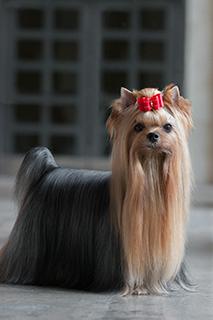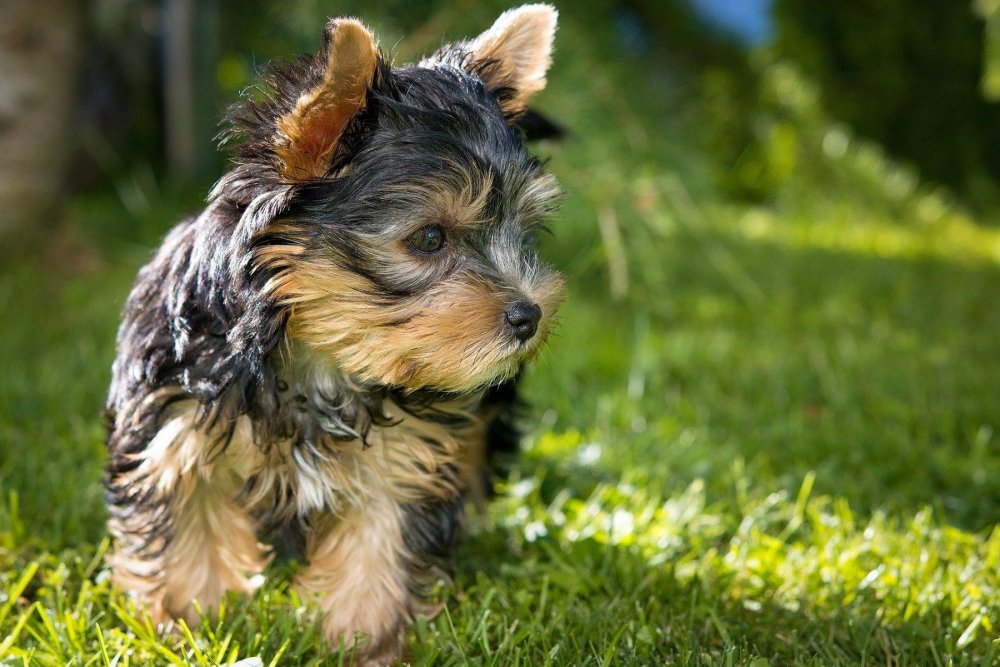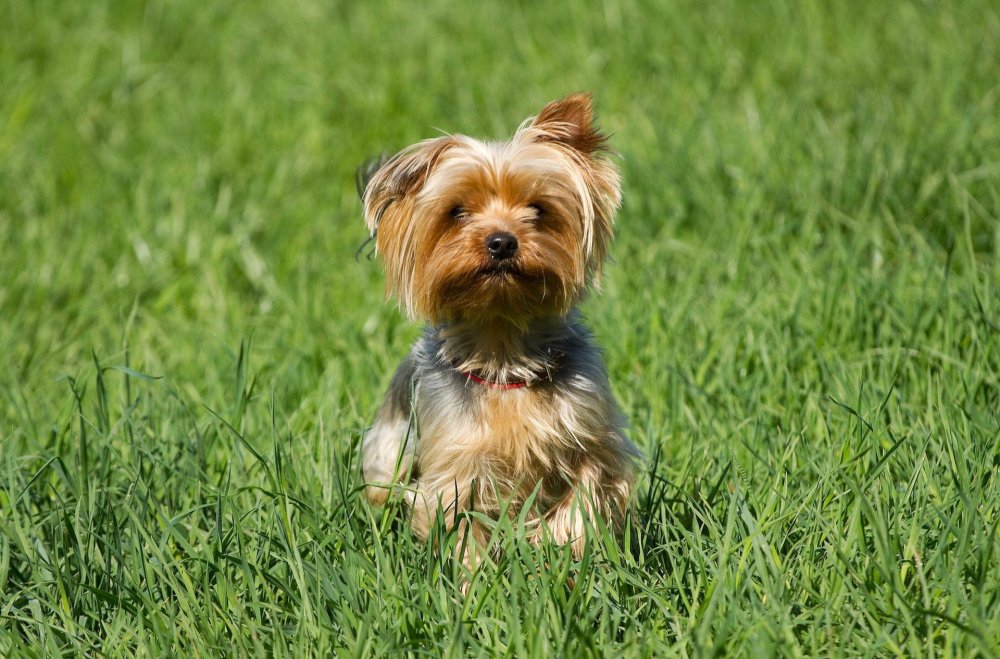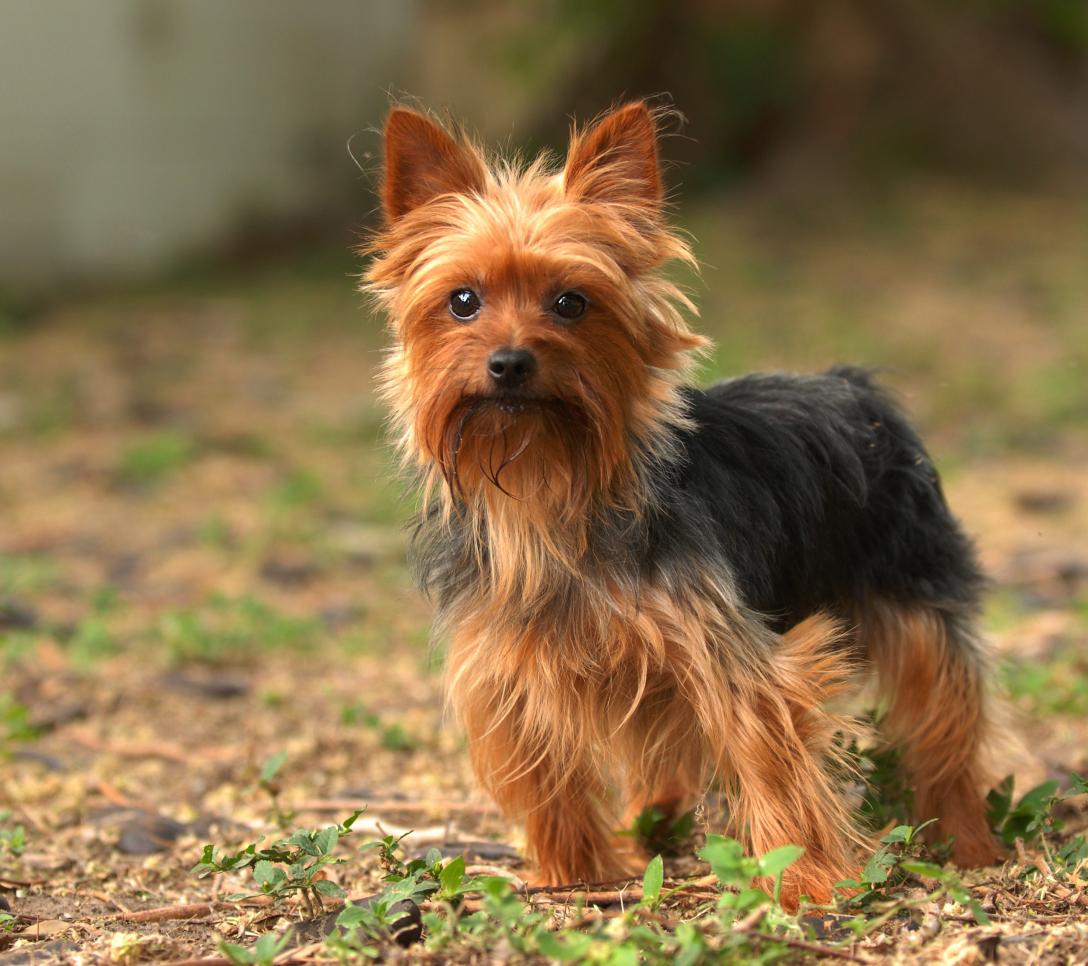- Breed Category: Toy Group
- Country of Origin: England
- Average Height: 20-23 cm (8-9 inches)
- Average Weight: 2-3 kg (4-7 pounds)
- Average Life Span: 12-15 years
- Grooming Requirements: High; regular brushing needed
- Exercise Requirements: Moderate; daily walks
- Coat Type: Long, silky
- Coat Color Variations: Blue and tan
- Shedding Level: Low
- Ear Type: Erect
- Tail Type: Docked or natural
- Temperament: Bold, confident, affectionate
- Intelligence Level: High
- Barking Tendency: High
- Compatibility with Children: Moderate; supervision recommended
- Compatibility with Other Pets: Generally good
- Training Ease: Moderate; can be stubborn
- Common Health Issues: Dental issues, patellar luxation
- Dietary Needs: High-quality small breed diet
- Energy Level: High
- Drooling Tendency: Low
- Sensitivity to Weather: Sensitive to cold
- Overall Maintenance Level: High
- Original Purpose: Ratting, companionship
- Year of Recognition by Kennel Clubs: 1886
- Famous Breed Representatives: Smoky, war hero dog
- Apartment Friendly: Yes
- Best Suited For: Singles, families, city living
- Cost of Ownership: Moderate to high
- Unique Traits: Hypoallergenic coat
- Cultural Significance: Popular in fashion and media
- Popularity Rank: Top 10 in Australia
Did you know that the Yorkshire Terrier, affectionately known as the Yorkie, consistently ranks among the top ten most popular dog breeds in Australia? These pint-sized pooches pack a lot of personality into their small frames. Originally bred in the 19th century to catch rats in clothing mills, Yorkies have a rich history that belies their dainty appearance. This article aims to delve into the fascinating world of the Yorkshire Terrier, exploring their unique characteristics, storied history, and essential care tips. Understanding their origins helps us appreciate why these dogs are so beloved today. From their beginnings in the industrial towns of Yorkshire, England, to their status as cherished companions, Yorkies have a tale worth telling.
The Yorkshire Terrier: A Storied Past and Distinctive Traits

Early Development of the Breed
In the bustling industrial towns of 19th-century England, the Yorkshire Terrier was born out of necessity. These small but mighty dogs were bred to tackle the rat problem in textile mills. Their keen hunting instincts and compact size made them perfect for the job. Over time, their role evolved, and they became beloved companions, admired for their spirited nature and elegant appearance.
Role in 19th-Century England
Yorkies were more than just working dogs; they were a symbol of the changing times. As the Industrial Revolution transformed England, these dogs found a place in both the working class and the homes of the wealthy. Their adaptability and charm made them popular across different social strata, bridging the gap between utility and luxury.
Key Historical Figures
Key figures in the development of the Yorkshire Terrier include Scottish weavers who migrated to England, bringing with them small terriers that would eventually contribute to the Yorkie’s lineage. These early breeders were instrumental in refining the breed’s characteristics, focusing on size, coat, and temperament.
Physical Characteristics
Yorkies are known for their striking appearance. They boast a silky, steel-blue and tan coat that requires regular grooming to maintain its lustre. Despite their small stature, usually weighing around 3 to 4 kilograms, they carry themselves with a confident and lively demeanour. Their bright eyes and perky ears add to their alert and inquisitive expression, making them as charming as they are feisty.
Appearance and Unique Traits
Yorkshire Terriers are a sight to behold with their luxurious, silky coats that shimmer in shades of steel-blue and tan. This distinctive coat is not just for show; it’s hypoallergenic, making them a great choice for those with allergies. Despite their petite size, usually tipping the scales at just 3 to 4 kilograms, Yorkies have a presence that commands attention. Their bright, intelligent eyes and perky ears give them an alert and curious look, perfectly matching their lively personalities.
Temperament and Behaviour
Don’t let their small size fool you; Yorkies are packed with personality. They’re known for their feisty and spirited nature, often acting as if they’re much larger than they are. This breed is incredibly loyal and forms strong bonds with their families. They thrive on attention and love being involved in family activities. While they can be a bit stubborn, their intelligence makes them highly trainable with the right approach. Yorkies are also known for their bravery, often standing up to much larger dogs without hesitation.
Yorkshire Terrier: Personality and Companionship

Typical Personality Traits
Yorkshire Terriers are a delightful mix of affectionate, bold, and energetic traits. They love to snuggle and show affection, making them perfect lap dogs. Despite their small size, they have a bold nature, often displaying a fearless attitude. Their energy levels are high, and they enjoy playtime and activities that engage their sharp minds.
Suitability as a Family Pet
Yorkies make excellent family pets and companions. Their affectionate nature means they thrive on human interaction and love being part of family life. They’re adaptable to various living situations, whether it’s a bustling household or a quieter environment.
Interaction with Children and Other Animals
Yorkies generally get along well with children, especially if they’re introduced at a young age. However, due to their small size, it’s important to supervise interactions with very young children to prevent accidental injuries. They can coexist with other pets, but their bold nature means they might try to assert themselves, even with larger animals.
Training and Exercise Needs
Training a Yorkie can be a rewarding experience. They’re intelligent and eager to please, although a bit of patience is needed due to their occasional stubborn streak. Consistent, positive reinforcement works best. Regular exercise is essential to keep them happy and healthy. Short walks and play sessions are usually enough to meet their needs, but they also enjoy mental challenges like puzzle toys.
Training, Exercise, and Health of Yorkshire Terriers

Importance of Early Training and Socialisation
Starting training and socialisation early is crucial for Yorkies. These little dogs have big personalities, and early exposure to different environments, people, and other animals helps them grow into well-rounded companions. It curbs any potential behavioural issues and ensures they adapt well to various situations.
Recommended Training Techniques
Yorkies respond best to positive reinforcement techniques. Use treats, praise, and play to reward good behaviour. Consistency is key, as is patience, given their occasional stubbornness. Short, engaging training sessions work wonders, keeping their attention and making learning fun.
Daily Exercise Requirements and Activities They Enjoy
Despite their size, Yorkies are energetic and need daily exercise. Short walks, interactive play, and mental stimulation like puzzle toys keep them happy and healthy. They love activities that challenge their minds and bodies, so mix it up to keep them engaged.
Health and Lifespan
Yorkshire Terriers are generally healthy, with a lifespan of 12 to 15 years. Regular vet check-ups, a balanced diet, and proper dental care are essential to maintain their health. Be mindful of common issues like dental problems and patellar luxation, and ensure they get the care they need to thrive.
Health and Care for Yorkshire Terriers

Common Health Issues
Yorkshire Terriers, while generally healthy, can be prone to certain health issues. Dental problems are common due to their small mouths, so regular teeth cleaning is a must. They may also experience patellar luxation, a condition affecting the kneecap, and tracheal collapse, which can cause breathing difficulties. Regular vet visits help catch these issues early.
Average Lifespan and Health Tips
With proper care, Yorkies can live between 12 to 15 years. A balanced diet, regular exercise, and mental stimulation are key to a long, healthy life. Keep their weight in check to avoid stress on their joints and ensure they have a safe, comfortable environment.
Preventative Care Recommendations
Preventative care is crucial for Yorkies. Regular vaccinations, flea and tick prevention, and heartworm medication are essential. Routine vet check-ups help monitor their health and catch any potential issues early. Dental care, including brushing and professional cleanings, is vital to prevent oral diseases.
Grooming and Maintenance
Yorkies have a beautiful, silky coat that requires regular grooming. Brush their coat daily to prevent tangles and matting. Regular baths keep their coat shiny and clean. Don’t forget to trim their nails and clean their ears to prevent infections. Grooming is not just about looks; it’s an important part of their overall health care.
Coat Care and Grooming Routines

Shedding and Seasonal Grooming Tips
Yorkshire Terriers are known for their stunning, silky coats, which require regular attention to keep them looking their best. Unlike many breeds, Yorkies don’t shed much, making them a great choice for those who prefer a cleaner home. However, their hair grows continuously, much like human hair, so regular grooming is essential. During seasonal changes, you might notice a bit more shedding, but it’s usually minimal.
To maintain their coat, daily brushing is recommended to prevent tangles and matting. A gentle brush will do the trick, keeping their hair smooth and shiny. Regular trims every few weeks help manage their coat length and keep them comfortable. Bathing should be done every few weeks, using a mild dog shampoo to maintain their coat’s natural oils.
Diet and Nutrition
A balanced diet is crucial for a Yorkie’s health and vitality. These little dogs have specific nutritional needs, so it’s important to choose high-quality dog food that meets their requirements. Look for options rich in protein and healthy fats to support their energy levels and coat health. Avoid foods with artificial additives or fillers, as these can lead to digestive issues.
Portion control is key, as Yorkies are prone to obesity if overfed. Stick to recommended serving sizes and monitor their weight regularly. Fresh water should always be available to keep them hydrated. Occasionally, you can offer healthy treats like small pieces of cooked chicken or carrots, but keep these to a minimum to avoid weight gain.
Nutritional Needs and Feeding Tips for Yorkshire Terriers

Nutritional Needs for Optimal Health
Yorkshire Terriers thrive on a diet rich in high-quality protein and healthy fats. These nutrients support their energy levels and help maintain their luxurious coats. Look for dog food that lists meat as the first ingredient and avoid those with artificial additives or fillers. Omega-3 and Omega-6 fatty acids are particularly beneficial for their skin and coat health.
Foods to Include and Avoid
Include lean meats like chicken or turkey, along with fish for those essential fatty acids. Vegetables such as carrots and peas can be a good source of vitamins. Avoid foods high in sugar, salt, and artificial preservatives. Chocolate, grapes, and onions are toxic to dogs and should be kept out of reach.
Feeding Schedules and Portion Recommendations
Yorkies do well with two to three small meals a day to keep their metabolism steady. Portion control is crucial to prevent obesity, so follow the serving sizes recommended on your chosen dog food. Adjust portions based on their activity level and consult your vet for personalised advice.
Fun Facts and Trivia
Did you know that Yorkies were once used as therapy dogs during World War II? Their small size and friendly nature made them perfect companions for soldiers. Despite their dainty appearance, these dogs have a history of bravery and resilience.
Famous Yorkshire Terriers in Media and History

Yorkies in the Spotlight
Yorkshire Terriers have made their mark in both media and history, proving that size doesn’t limit fame. One of the most famous Yorkies is Smoky, a tiny war hero from World War II. Found in a foxhole in New Guinea, Smoky became a beloved mascot and therapy dog for soldiers, even helping to lay communication lines by navigating through narrow pipes.
Yorkies on the Silver Screen
In the world of entertainment, Yorkies have charmed audiences with their adorable looks and spirited personalities. Toto, from the classic film “The Wizard of Oz,” was originally portrayed by a Cairn Terrier, but many adaptations have featured Yorkies in the role, capturing the hearts of viewers with their plucky demeanour.
Celebrity Companions
Yorkies have also been the chosen companions of many celebrities. Audrey Hepburn’s beloved Yorkie, Mr. Famous, often accompanied her on set and was a constant presence in her life. These little dogs have a knack for stealing the spotlight, whether in the arms of a star or on the big screen.
Final Thoughts

The Yorkshire Terrier is a small dog with a big personality. Their rich history and distinctive traits make them beloved companions worldwide. Despite their grooming and training challenges, the rewards of owning a Yorkie are immense, offering loyalty, affection, and endless charm. Embracing their spirited nature and unique needs ensures a fulfilling relationship with these delightful dogs. Consider welcoming a Yorkie into your life and experience the joy they bring firsthand.
